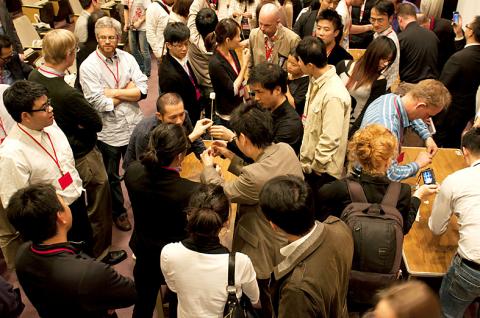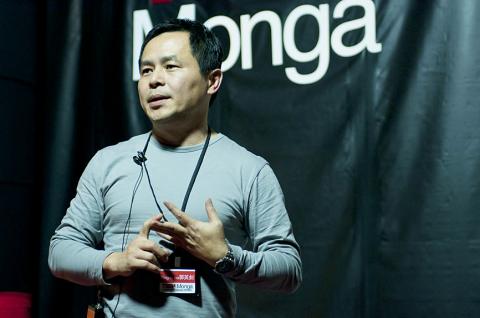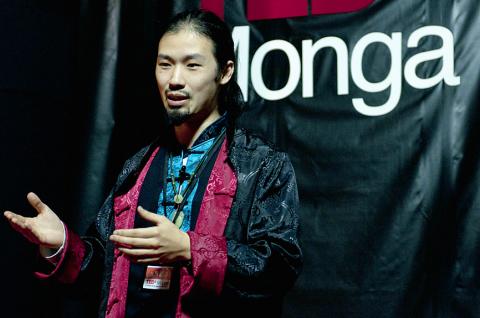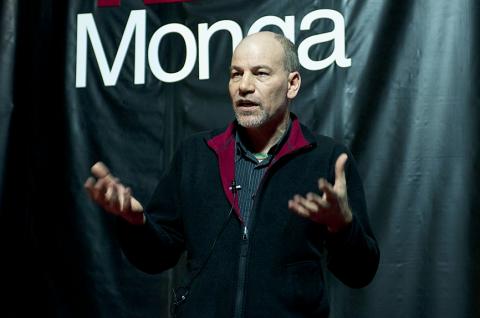Architects, entrepreneurs and artists were among the diverse speakers that gathered at the National Taiwan University in Taipei on Thursday for TEDxMonga.
Around 100 people listened to an afternoon of lectures and presentations, which were modeled on the TED (Technology, Entertainment, Design) conferences held annually in California.
With its slogan “ideas worth spreading,” TED has become a global brand, thanks in part to its popular “TED Talks,” which are short but often thought-provoking presentations on a wide variety of topics by high-profile figures, and are available to view online for free at the organization’s Web site.

Photo: Dilip Bhoye, courtesy of TEDxMonga
TEDx is the local version of the conference, independently started and run by volunteers and enthusiasts from all over the world, who apply for licenses to hold their own events.
Tied to themes of innovation and social change in Taiwan, the topics at TEDxMonga ranged from the quirky to the visionary.
South African expat photographer Tobie Openshaw spoke about documenting Taiwan’s betelnut girls; French artist Lucie Kelche described her ongoing apprenticeship with one of Taiwan’s most renowned traditional puppeteers; architects Kuo Ying-chao (郭英釗) and Chang Ching-haw (張清華), best known for their work at the Taipei International Flora Expo and the Beitou Branch of the Taipei Public Library (台北市立圖書館北投分館), talked about the inspiration behind their eco-friendly architecture.

Photo: Dilip Bhoye, courtesy of TEDxMonga
One of TEDxMonga’s organizers, British expat Christopher Gray, says the speakers were chosen for their tangible achievements, which fit under the event’s banner theme “Make It Real.”
“[We sought] people who weren’t just talking about what they wanted to do,” he told the Taipei Times. “They had actually gone out and done something and they had something concrete they could show you and that they could talk about. [We wanted to hear from] people who made some change, not just followed a career path from a young age.”
Indeed, some of the speakers took unconventional career paths. Hong Kong-native Herbert Ng (吳奕敬), started out as a computer game programmer in Beijing, but wound up moving to Taipei after being charmed by its “cafe culture,” which further ignited his passion for coffee.

Photo: Dilip Bhoye, courtesy of TEDxMonga
Ng runs an online business selling freshly roasted coffee, and is still applying tech ideas to his favorite beverage: He says he’s currently building a “social coffee database” to help retailers learn about customers’ favorite beans or blends.
This would overturn the traditional business model in which shops are “pushing tastes to consumers,” he said. Instead, members of the Internet community would be the ones customizing their own products, Ng said.
A good TED presentation both informs and entertains, and Ng also did plenty of the latter, drawing laughs with well-timed jokes and humorous photographs throughout his presentation.

Photo: Dilip Bhoye, courtesy of TEDxMonga
Others such as Kuo and Chang, the architects, appealed to the audience’s sense of idealism. They explained the philosophy behind their eco-friendly building designs, and elicited cheers and loud applause for their vision of an economy based on a “tree reserve” instead of a “gold reserve.”
Another socially-minded speaker was entrepreneur Shih Ting-chi (石亭芝), who founded ClickDiagnostics, a technology company devoted to helping communities with poor health care infrastructures.
Shih gave one example of her company’s work in Botswana, where people in remote rural areas have difficulty getting access to doctors. She says her company has built a platform designed to help patients receive essential health screenings and diagnoses from doctors in faraway cities using mobile phone technologies.
This was the first ever event for TEDxMonga, and there were a few technical blips involving sound and visual presentations that could have been better rehearsed. But that didn’t dampen the audience’s enthusiasm, and it gave the event a relaxed, casual feel.
TEDxMonga took its name from the former moniker for Wanhua (萬華), one of Taipei’s oldest districts — one speaker in particular exemplified this historical spirit. Kelche, the French artist, talked about her ongoing apprenticeship with legendary 69-year-old puppeteer Chen Hsi-huang (陳錫煌).
Kelche, a theater designer by training, said she was attracted to Taiwanese hand puppetry for its “multi-disciplinary” aspects, which include the carving of the puppets, costume and stage design and performance.
She now tours internationally with Chen’s group, and offered a few insights on their “master-disciple” relationship, describing it as “like adoption.” She pays no money or tuition to study with the puppet master, but says her decision to study the art has become a full-time commitment.
“It’s about working your whole life and getting better and better,” Kelche said.
Openshaw, the South African expat photographer, gave a well-received presentation on his documentary work on betelnut girl culture. He talked about the social stigmas attached to Taiwan’s infamous betelnut vendors, and joked about being called a “weirdo.”
But he sought to dispel a few stereotypes about betelnut girls, saying “this business has many layers.” Openshaw said that in his observation, prostitution was not as nearly as rampant as commonly believed, and that a rising number of betelnut stands are being run by women.
In his talk, Openshaw offered an insight that captured the event’s ethos. “With the information age, we have more information, but somehow the nuances are getting lost,” he said. “I’d like to invite you to consider the gray areas. Let’s all be weirdos together.”
TEDxMonga is scheduled to take place next year, and for fans, there is also TEDxTaipei, a separate event started last year by the organization The Big Question.
All talks from TEDxMonga will be available for viewing online later this week at the event’s Web site, tedxmonga.com.

One of the biggest sore spots in Taiwan’s historical friendship with the US came in 1979 when US president Jimmy Carter broke off formal diplomatic relations with Taiwan’s Republic of China (ROC) government so that the US could establish relations with the People’s Republic of China (PRC). Taiwan’s derecognition came purely at China’s insistence, and the US took the deal. Retired American diplomat John Tkacik, who for almost decade surrounding that schism, from 1974 to 1982, worked in embassies in Taipei and Beijing and at the Taiwan Desk in Washington DC, recently argued in the Taipei Times that “President Carter’s derecognition

This year will go down in the history books. Taiwan faces enormous turmoil and uncertainty in the coming months. Which political parties are in a good position to handle big changes? All of the main parties are beset with challenges. Taking stock, this column examined the Taiwan People’s Party (TPP) (“Huang Kuo-chang’s choking the life out of the TPP,” May 28, page 12), the Democratic Progressive Party (DPP) (“Challenges amid choppy waters for the DPP,” June 14, page 12) and the Chinese Nationalist Party (KMT) (“KMT struggles to seize opportunities as ‘interesting times’ loom,” June 20, page 11). Times like these can

You can tell a lot about a generation from the contents of their cool box: nowadays the barbecue ice bucket is likely to be filled with hard seltzers, non-alcoholic beers and fluorescent BuzzBallz — a particular favorite among Gen Z. Two decades ago, it was WKD, Bacardi Breezers and the odd Smirnoff Ice bobbing in a puddle of melted ice. And while nostalgia may have brought back some alcopops, the new wave of ready-to-drink (RTD) options look and taste noticeably different. It is not just the drinks that have changed, but drinking habits too, driven in part by more health-conscious consumers and

JUNE 30 to JULY 6 After being routed by the Japanese in the bloody battle of Baguashan (八卦山), Hsu Hsiang (徐驤) and a handful of surviving Hakka fighters sped toward Tainan. There, he would meet with Liu Yung-fu (劉永福), leader of the Black Flag Army who had assumed control of the resisting Republic of Formosa after its president and vice-president fled to China. Hsu, who had been fighting non-stop for over two months from Taoyuan to Changhua, was reportedly injured and exhausted. As the story goes, Liu advised that Hsu take shelter in China to recover and regroup, but Hsu steadfastly